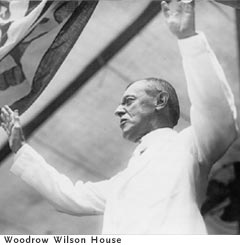Middle "Modern" Presidents
Wilson, Harding, Coolidge, Hoover

Andrews, J. R. (2002). Presidential leadership and national identity: Woodrow Wilson and the meaning of America. In L. G. Dorsey (Ed.), The presidency and rhetorical leadership (pp. 129-144). College Station, TX: Texas A&M University Press.
Edy, J. A. (2001). The presence of the past in public discourse. In R. P, Hart and B. H. Sparrow (Eds.), Politics, discourse, and American society: New agendas (pp. 53-70). Lanham, MD: Rowman & Littlefield Pub.
Flanagan, J. C. (2004). Woodrow Wilson's "Rhetorical Restructuring": The transformation of the American self and the construction of the German enemy. Rhetoric & Public Affairs, 7, 115-148.
Hoffman, K. S. (2002). "Going Public" in the nineteeth century: Grover Cleveland's repeal of the Sherman Silver Purchase Act. Rhetoric and Public Affairs, 5, 57-77.
Hasian, M., Jr. (2005). Calvin Coolidge and the rhetoric of "race" in the 1920s. In J. A. Aune and E. D. Rigsby (Eds.) Civil rights rhetoric and the American presidency (pp. 41-61) . College Station, TX: Texas A&M University Press.
Houck, D. W. (2001). Rhetoric as currency: Hoover, Roosevelt, and the Great Depression. College Station, TX: Texas A&M Univetsity Press.
Palmer, N. A. (2008). The Veterans' Bonus and the evolving presidency of Warren G. Harding. Presidential Studies Quarterly, 38, 39–60.
Shogan, C. J. (2006). Coolidge and Reagan: The rhetorical influence of Silent Cal on the Great Communicator. Rhetoric and Public Affairs, 9, 215-234.
Stuckey, M. E. (2003). "The domain of public conscience": Woodrow Wilson and the establishment of a trascendent political order. Rhetoric and Public Affairs, 6, 1-24.